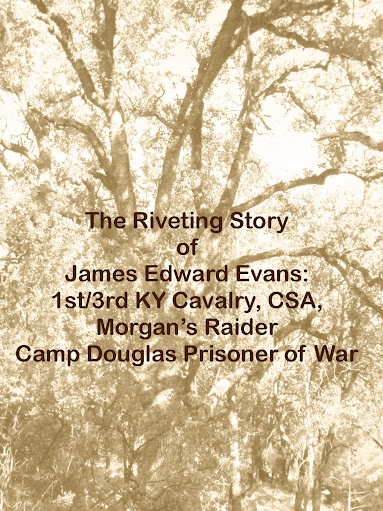“AROUSE, KENTUCKIANS! Let the old men of Kentucky, and our noble-hearted women, arms their sons and their lovers for the fight! Better death in our sacred cause than a life of slavery!”
~ Broadside circulated by Morgan’s Men as they reached the Kentucky, August 22, 1862
In selecting the words, “Arouse, Kentuckians,” Morgan may have been referencing a Southern war poem “By Kentucky” which began,
“Arouse, Kentuckians, or my heart will break!”[i]
Morgan’s broadside was followed by a proclamation issued by Major General Edmond Kirby Smith who sought to mobilize the civilian population in support of the Confederacy:
“Kentuckians: The Army of the Confederate States has again entered your territory under my command.
Let no one make you believe we come as invaders, to coerce your will, or to
exercise control over your soil. Far from it. The principle we maintain is, that
Government derives it just power from the consent of the Governed.
I shall enforce the strictest discipline in order that the property of citizens & noncombatants may be protected. I shall be compelled to procure subsistence for my troops among you, and this shall be paid for.
Kentuckians: We come not as invaders, but liberators. We invoke the spirit of your resolutions of 1798. We come to arouse you from the lethargy which enshrouds your free thought and forebodes the political death of your state.
We come to test the truth of what we believe to be a foul aspersion, that
Kentuckians willingly join the attempt to subjugate and to deprive us of our property, our liberty and our dearest rights.
We come to strike off the chains which are riveted upon you. We call upon you to unite your arms & join with us in hurling back from our fair & sunny plains the Northern hordes who would deprive us of our liberty, that they may enjoy our substance.
Are we deceived? Can you treat us as enemies? Our hearts answer no”
While such language sounds over romanticized to our ears, it is important to note that poetry and folk ballads were primary means of spreading propaganda during the Civil War. Southern newspapers often published poetry as a form of patriotic propaganda. The author of the following “call to arms” poem was merely identified as “Boone” which was likely a pseudonym.
Kentucky Required to Yield Her Arms
Ho! will the despot trifle,
In dwellings of the free;
Kentuckians yield the rifle,
Kentuckians bend the knee!
With dastard fear of danger,
And trembling at the strife;
Kentucky, to the stranger,
Yield liberty for life!
Up! up! each gallant ranger,
With rifle and with knife!
The bastard and the traitor,
The wolfcub and the snake,
The robber, swindler, hater,
Are in your homes--awake!
Nor let the cunning foeman
Despoil your liberty;
Yield weapon up to no man,
While ye can strike and see,
Awake, each gallant yeoman,
If still ye would be free!
Aye, see to sight the rifle,
And smite with spear and knife,
Let no base cunning stifle
Each lesson of your life:
How won your gallant sires
The country which ye keep?
By soul, which still inspires
The soil on which ye weep!
Leap up! their spirit fires,
And rouse ye from your sleep!
"What!" cry the sires so famous,
In Orleans' ancient field,
"Will ye, our children, shame us,
And to the despot yield?
What! each brave lesson stifle
We left to give you life?
Let apish despots trifle
With home and child and wife?
And yield, O shame! the rifle,
And sheathe, O shame! the knife?"[ii]
Kentuckian J. R. Barrick personified the Commonwealth as a grieving war mother desperate for a champion to redeem her honor. Barrick also was most likely a pseudonym, possibly of a Confederate officer or West Point cadet who sought a witty nom de plume. Whether the selection of a pen name was made in modesty or for reasons of personal safety remains a mystery.
Kentucky, She Is Sold
A tear for "the dark and bloody ground,"
For the land of hills and caves;
Her Kentons, Boones, and her Shelbys sleep
Where the vandals tread their graves;
A sigh for the loss of her honored fame,
Dear won in the days of old;
Her ship is manned by a foreign crew,
For Kentucky, she is sold.
The bones of her sons lie bleaching on
The plains of Tippecanoe,
On the field of Raisin her blood was shed,
As free as the summer's dew;
In Mexico her McRee and Clay
Were first of the brave and bold--
A change has been in her bosom wrought,
For Kentucky, she is sold.
Pride of the free, was that noble State,
And her banner still were so,
Had the iron heel of the despot not
Her prowess sunk so low;
Her valleys once were the freeman's home,
Her valor unbought with gold,
But now the pride of her life is fled,
For Kentucky, she is sold.
Her brave would once have scorned to wear
The yoke that crushes her now,
And the tyrant grasp, and the vandal tread,
Would sullen have made her brow;
Her spirit yet will be wakened up,
And her saddened fate be told,
Her gallant sons to the world yet prove
That Kentucky is not sold.[iii]
Southern war poetry gave full reign to emotions of fear, hatred, sympathy, patriotism, and consumerism.
The Cotton-Burners' Hymn.
"On yesterday, all the cotton in Memphis, and throughout the country,
was burned. Probably not less than 300,000 bales have been burned in the
last three days, in West Tennessee and North Mississippi."
--Memphis Appeal.
I.
Lo! where Mississippi rolls
Oceanward its stream,
Upward mounting, folds on folds,
Flaming fire-tongues gleam;
'Tis the planters' grand oblation
On the altar of the nation;
'Tis a willing sacrifice--
Let the golden incense rise--
Pile the Cotton to the skies!
CHORUS--Lo! the sacrificial flame
Gilds the starry dome of night!
Nations! read the mute acclaim--
'Tis for liberty we fight!
Homes! Religion! Right!
II.
Never such a golden light
Lit the vaulted sky;
Never sacrifice as bright,
Rose to God on high:
Thousands oxen, what were they
To the offering we pay?
And the brilliant holocaust--
When the revolution's past--
In the nation's songs will last!
CHORUS-Lo! the sacrificial flame, etc.
III.
Though the night be dark above,
Broken though the shield--
Those who love us, those we love,
Bid us never yield:
Never! though our bravest bleed,
And the vultures on them feed;
Never! though the Serpents' race--
Hissing hate and vile disgrace--
By the million should menace!
CHORUS-Lo! the sacrificial flame, etc.
IV.
Pile the Cotton to the skies;
Lo! the Northmen gaze;
England! see our sacrifice--
See the Cotton blaze!
God of nations! now to Thee,
Southrons bend th' imploring knee;
'Tis our country's hour of need--
Hear the mothers intercede--
Hear the little children plead!
CHORUS-Lo! the sacrificial flame, etc.[iv]
Propaganda was not limited to use on the home front. In an effort to affect opinion abroad, the Confederate leadership employed the skills of European writers. The most influential of these writers may have been Swiss- born Henry Hotze. Hotze produced a weekly journal entitled “The Index,” which promoted the Confederate cause. While “The Index” had a small circulation of about 2,000 copies, its readership extended throughout England, Ireland, and France. It is known that members of the British government read “The Index” and that smuggled copies were found in Northern states.[v] Regardless of the reach of the message, the Confederate pens could not sway Europeans to lift their swords.
ENDNOTES
[i] Ellinger, Esther Parker. “ The Southern War Poetry of the Civil War,” 1918
[ii] Wharton, Henry Marvin. “ War Songs and Poems of the Southern Confederacy, 1861 -1865,” 1904
[iii] Simms, William Gilmore. “War Poetry of the South” 1867
[iv] Wharton, Henry Marvin. “ War Songs and Poems of the Southern Confederacy, 1861 -1865,” 1904
[v] Oates, Stephen B. "Henry Hotze: Confederate Agent Abroad." Historian 27,February 1965, pages 131-54.





No comments:
Post a Comment